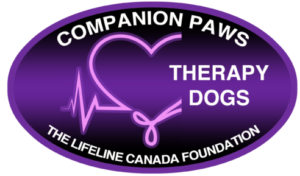Companion Paws Detailed Program Process
Costs:to re
1 – First Temperament Assessment – $55.00
2. Therapy Dog Skills Training Online Course
3. Second Temperament Assessment
4. Final Evaluation
Step 2, 3 & 4 – $250.00
One must complete a Temperament Assessment with a Companion Paws Assessor before registering for the remainder of the program process. Please note: Health records and vaccinations must be up to date prior to the First Temperament Assessment.
Upon successfully completing TLC’s Companion Paws Final Evaluation, you will be emailed registration documents to be completed and returned with any required supporting documentation. The new certified team will then receive a Companion Paws Canada Therapy Dog Vest, Identification Card and Certificate of Registration. Companion Paws supplies letters of certification, landlord letters and airline letters by request.
Owners are required to renew their Companion Paws Certification, complete a form and re-evaluate annually to continue to be certified by Companion Paws Canada. The annual renewal fee is $95 and includes the required annual re-evaluation.
Guidelines
- Calm and gentle temperament
- Very well trained. Obedience, manners and socialization training.
- Very friendly.
- Great with people of all ages and not aggressive to people or other dogs.
- Dogs are expected to be clean and healthy with up to date vaccinations.
- Minimum age of dog is 1.5 years old. There is no age limit on dogs.
Everyone with TLC’s Companion Paws is a dog lover. As such, we only qualify dogs who enjoy interacting with strangers to protect dogs who don’t from being over-stressed or forced into such activities.
To qualify as a therapy dog, the dog must have up to date medical health records letter from his or her veterinarian, current dog license and must have no aggression towards people or other dogs (including un-neutered male dogs).
For personal therapy dog certification, you must have a letter from your current mental health professional on letter head, with date, signature, your name and why a therapy dog would benefit you.
1. First Temperament Assessment
The first part of the Companion Paws Therapy Dog certification process is a First Temperament Assessment to confirm suitability as a therapy dog for your requested designation of Personal, Assisted or Visiting therapy. The assessment will take approximately 30 minutes. You may request more than one Therapy Dog designation. You must pass the first temperament assessment to register for the last 3 steps of TLC’s Companion Paws program. To request the First Temperament Assessment for confirmation of suitability for the program, please click the following link to register for a First Temperament Assessment.
The purpose of the 30-minute temperament assessment is to establish both that the dog is not a safety risk and both dog and handler are suitable for – their respective designations.
The Assessment is to confirm:
- Level of Aggression
- Protectiveness
- Stability
- Confidence
- Friendliness
Summary of First Temperament Assessment:
1. Approach
2. Possession
3. Touch and Handling
4. Food
5. Responsiveness to Redirection
6. Pressure Stimuli
7. Dog to Dog Introduction
8. Dog to Dog Food Issues
9. Overall Behavior
2. Companion Paws Therapy Dog Skills Training Online Course
The second step of the program is the Skills Training Online Course.
- Reading Resources include information about the Program, the Process, By laws, Code of Conduct, Rules and Regulations.
- Skill training Videos
- Online course final Quiz
Summary of the online course skills training videos;
- Teaching a Cue
- Watch and Focus “Watch Command”
- The “Down” Cue
- The “Stay” Cue
- The “Come” Cue
- Loose Leash Basics
- Loose Leash Walking
- Sitting When Stopped
- Introducing a Wheelchair “Stationary”
- Introducing a Wheelchair “Adding Motion”
- Introducing Crutches: “Stationary”
- Introducing Crutches: “Adding Movement”
- Distractions: Keeping Your Dog Engaged
- Conditioning to Loud Noises
- Conditioning to Clumsy People
- Conditioning to Inappropriate Petting
- Conditioning to Multiple People Petting
- Accepting a Friendly Stranger
- Leave It: “Food Distractions”
- It’s Your Choice: A Self-Control Game for Your Dog
- No Jump Manners
- Greeting Another Dog
- Supervised Separation
3. Second Temperament Assessment
The third part of the Companion Paws Therapy Dog certification process is a Temperament Assessment to again confirm suitability as a therapy dog for your requested designation(s) of Personal, Assisted or Visiting therapy. You may request more than one Therapy Dog designation.
Summary of Second Temperament Assessment:
1. Approach
2. Possession
3. Touch and Handling
4. Food
5. Responsiveness to Redirection
6. Pressure Stimuli
7. Dog to Dog Introduction
8. Dog to Dog Food Issues
9. Overall Behavior
4. Final Evaluation
The CPC evaluation is divided into two stages and has 17 individual tests and additional exercises within each test. The Temperament Assessment is not included in this number.
What to bring to the Final Evaluation;
- Bring a proper lead and collar so your dog is always manageable in the group.
- Bring your own grooming tool to the final evaluation
Summary of Final Evaluation;
- Accepting a Friendly Stranger
- Sitting Politely for Petting and Aggravating Stranger
- Out for a Walk (Walking on a close leash)
- Walking Through a Crowd
- Sit and Down on Command (Staying in one place)
- Coming When Called
- Reaction to Another Dog
- Reactions to Distractions x 2
- Reaction to Medical Equipment x 2
- Leave It x 2
- No Mark Manners
- Supervised Separation (time – one minute)
- Say Hello
- Grooming and Appearance
